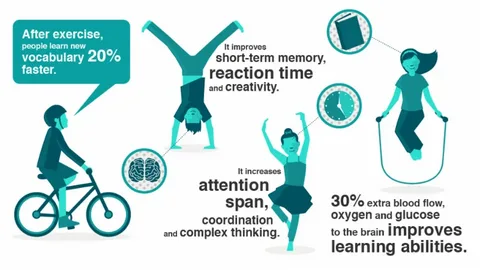Exercising is one of the best habits for maintaining both physical and mental well-being. Exercising can help boost your physical health by increasing energy levels, improving cardiovascular health, enhancing flexibility, strengthening muscles, and more. Additionally, exercise offers significant mental health benefits, such as reducing stress and anxiety, promoting better sleep, and improving cognitive function. To enjoy these benefits, aim for at least 150 minutes of moderate-intensity aerobic activity or 75 minutes of vigorous-intensity activity per week, as recommended by WHO. Let’s dive deeper into the numerous benefits exercise has to offer for both your mental and physical health.
5 Mental Health Benefits of Exercising
1. Reduces Stress and Anxiety
Exercise triggers the release of endorphins, which are natural mood boosters. These chemicals help reduce stress and alleviate symptoms of anxiety, creating a sense of relaxation and well-being. Regular physical activity also lowers cortisol, the hormone responsible for triggering your body’s stress response.
2. Improves Mood
Exercise is a powerful mood enhancer and is frequently recommended as part of depression treatment. Physical activity stimulates the production of neurotransmitters like serotonin and dopamine, which play a crucial role in regulating emotions and fostering positive thought patterns.
3. Enhances Cognitive Function
Exercise boosts brain function by increasing blood flow and oxygen supply to the brain. This improvement supports memory, focus, and decision-making abilities, and it also lowers the risk of cognitive decline as you age.
4. Builds Self-Esteem
Achieving fitness goals helps build self-esteem and a sense of accomplishment. Regular exercise also improves body image and boosts confidence, contributing positively to mental health and overall well-being.
5. Encourages Good Sleep
Physical activity plays a significant role in improving sleep quality. Exercise reduces symptoms of insomnia and encourages deep sleep, which is essential for both physical recovery and mental rejuvenation.
5 Physical Health Benefits of Exercising
1. Heart Health Improvement
Exercise strengthens the heart muscles, improves circulation, and helps lower blood pressure. Regular physical activity reduces the risk of cardiovascular diseases, such as heart attack and stroke, by promoting healthy cholesterol levels.
2. Helps in Weight Management
Regular exercise helps burn calories and boost metabolism, making it easier to manage weight. Combined with a balanced diet, exercise plays a crucial role in maintaining or achieving a healthy weight.
3. Musculature and Bone Strengthening
Resistance exercises, such as weight training, are excellent for increasing bone density and muscle strength. This reduces the risk of osteoporosis and prevents age-related muscle loss, ensuring better balance and mobility.
4. Immune Function Improvement
Moderate exercise boosts your immune system by improving circulation and increasing the effectiveness of immune cells. It also helps reduce inflammation and enhances the body’s ability to fight infections.
5. Raises Energy Levels
Exercise increases endurance and reduces feelings of fatigue by improving oxygen and nutrient delivery to tissues. It also supports mitochondrial function, which is crucial for energy production at the cellular level.
By incorporating regular exercise into your routine, you can experience significant improvements in both your mental and physical health, enhancing your overall quality of life.



